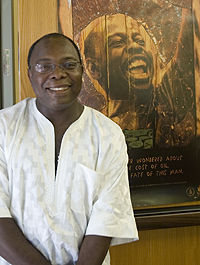Berkeleyan
Remembering Ken Saro-Wiwa
A decade after the Nigerian writer-activist's execution, the struggle for human rights lives on
![]()
| 12 October 2005
 Owens Wiwa stands beside a poster of his brother, Ken Saro-Wiwa, before his appearance at the Townsend Center. Saro-Wiwa was executed by the Nigerian military in 1995; his last words were reportedly, "Lord, take my soul, but the struggle continues." (Deborah Stalford photo) |
The 54-year-old Saro-Wiwa was convicted of inciting a riot in which four pro-government Ogoni chiefs were killed. His real "crime," in the eyes of supporters, was standing up for the rights of the Ogoni people, an ethnic group of some 550,000 farmers and fishermen living in the Niger Delta, where Royal Dutch/Shell had struck oil in 1958. Decades of environmental destruction, public-health problems, and increasing poverty had led Saro-Wiwa and others to start the Movement for the Survival of the Ogoni People, better known as MOSOP. The avowedly nonviolent group wanted Shell to share its billions of dollars in oil revenues and repair the ecological devastation caused by drilling, oil spills, and acid rain.
"Our environment, our livelihood, was destroyed by Shell," Wiwa said last Thursday at the Townsend Center, at an event co-sponsored by several campus departments and groups. He added that MOSOP was formed to address a fundamental injustice: "Why should we receive 100 percent of the pollution, but zero percent of the profits?"
Wiwa, a physician now based in Toronto, was on campus to commemorate the 10th anniversary of Saro-Wiwa's execution, with eight other MOSOP leaders, on Nov. 10, 1995. Appearing on a panel with Berkeley geography professor Michael Watts, director of the Center for African Studies, and San Francisco attorney Cindy Cohn, he said the injustices in Ogoniland continue, and vowed to carry on his brother's legacy of nonviolent protest.
Shell ceased its operations in the region in 1993, while Abacha, who seized power that year, died suddenly in 1998. Watts, however, told an attentive audience that oil still "saturates the political economy of Nigeria," noting the continued presence of what Saro-Wiwa termed "the slick alliance." That label, he explained, referred to an "unholy trinity" comprising the multinational oil industry, the military rulers of Nigeria, and geostrategic players including the U.S., British, French, and Italian governments.
A central concern for Saro-Wiwa, said Watts, was to expose this alliance and "provide the means by which it, frankly, could be taken apart in nonviolent and peaceful ways."
Before he turned to activism, Saro-Wiwa was well known in Nigeria as a novelist and producer of an enormously popular television soap opera. In 1993 he led 300,000 Ogoni in a demonstration to demand a share in Shell's profits and greater political autonomy. He was imprisoned for a month in 1993, then arrested again in May 1994 on murder charges.
The trial, conviction, and execution drew international condemnation, with MOSOP supporters accusing Shell of sponsoring the repression of the Ogoni. Shell adamantly denied any responsibility for the military regime's actions, though it did ask the government to send troops into the area to protect its investments and, according to The New York Times, "paid for the transportation and salary bonuses of some troops - ostensibly oilfield guards - who committed the abuses."
Shell, the Times reported, "also accused Mr. Saro-Wiwa of supporting violence" and "expressed no regret at the death sentences."
Owens Wiwa, by contrast, remembered his brother as a man of peace, someone who was "a little bit rich" but who was disturbed at the plight of the Ogoni, and determined "from the outset" there should be "no violence" in the MOSOP-led campaign. He said Saro-Wiwa would periodically visit his medical clinic, where the writer witnessed "the slow genocide of the Ogoni people," most of whom had no electricity or running water, and were dependent on streams polluted by oil spills. Gas flaring from oil operations, he added, contributed to acid rain and high rates of childhood asthma.
"I was busy treating what Ken was busy trying to prevent," he said.
Economically, he continued, Shell's operations despoiled farmland, rivers, and fishing creeks, the foundations of people's livelihoods - hardships exacerbated by the costs of rising medical needs.
Cohn, the legal director for the Electronic Frontier Foundation in San Francisco, is representing a group of Nigerian plaintiffs in a federal lawsuit alleging that Chevron paid for the destruction of two Nigerian villages in 1999. She described the "incestuous relationship" between Chevron and the military there, and said evidence shows that navy personnel provided Chevron with a bill following a raid that "burned two villages to the ground."
Wiwa said thousands of Ogoni activists went into exile immediately after his brother's death, leaving the movement scattered. "And that," asserted Wiwa, "was the intention." But with Shell no longer in Ogoniland, he added, "trees are greener, air is cleaner, water is cleaner," and the region has seen a "restoration of dignity" and the return of nongovernmental organizations to the region.
"The absence of transnational corporations means peace to us," Wiwa said.
But he offered a warning as well. "Violence will come back to Ogoniland if they come back," Wiwa predicted. "That's why we are trying to prevent them from coming back."

